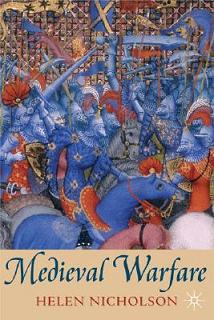
Medieval Warfare
Helen Nicholson
232 pages including index
published in 2004
Helen Nicholson’s Medieval Warfare is, as she puts it in her introduction, “intended to provide a point of entry tpo the subject of medieval warfare for students and others with an interest in the subject who are perplexed by the rapidly expanding body of scholarship in this area”. Which is just what I needed, as this is indeed a subject I’ve become interested in following on from my earlier readings in Late Antiquity and the Early Middle Ages. Medieval Warfare is an ambitious book for trying to cover this whole period (300 to 1500 CE) even in overview in just 166 pages, excluding index. But Nicholson is a reader in history at Cardiff University who has written extensively on Medieval military matters and therefore is well suited to the task.
As any good historian should, she sets out how she will go about it in her preface. What she attempts to do is to look at the development of the main aspects of medieval warfare from just after the end of the (western) Roman Empire to the end of the Middle Ages, using concrete examples to illustrate these developments. She chose the period 300 to 1500 CE to emphasise the continuity between the military practises of the Late Roman Empire and the Middle Ages, with the latter date providing a convenient cutting off point between them and the Renaissance. The fourth century was chosen as a starting point because it was in the late fourth century that the Roman bureaucrat Vegetius wrote his manual on military strategy, a book that was hugely influential in European warfare until at least the sixteenth century. Geographically, Nicholson limits herself mostly to Europe, particularly France, Italy, England and Germany for her examples, though she does look to Eastern/Byzantine examples as well when appropriate.